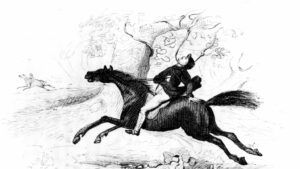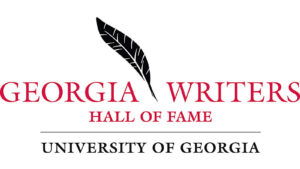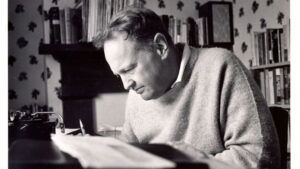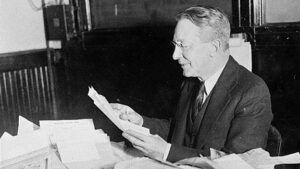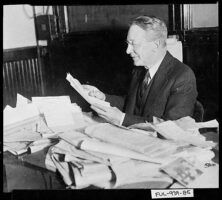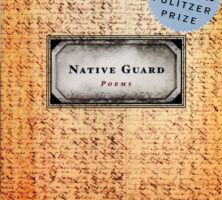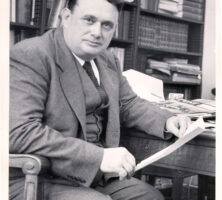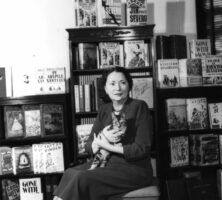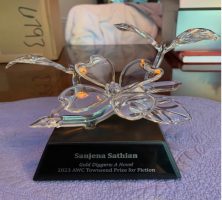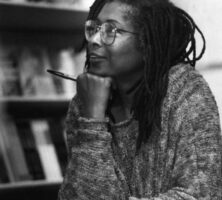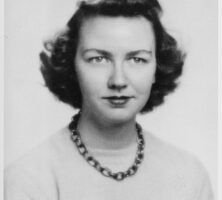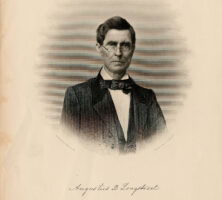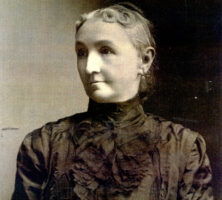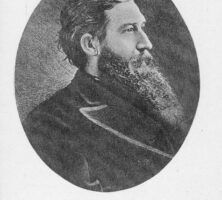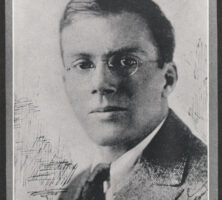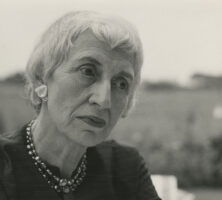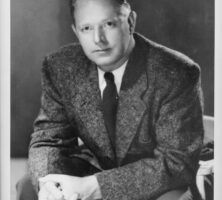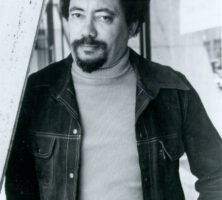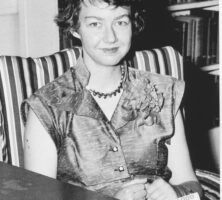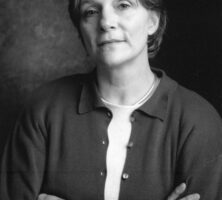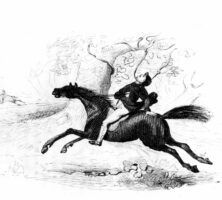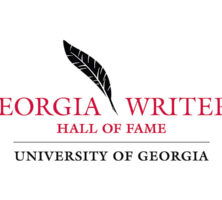The New Georgia Encyclopedia is supported by funding from A More Perfect Union, a special initiative of the National Endowment for the Humanities.
Julian Harris, editor and co-owner, with his wife, Julia, of the Columbus Enquirer-Sun, reads mail at his desk in the late 1920s. Harris, the son of Georgia folklorist Joel Chandler Harris, and his wife jointly won a Pulitzer Prize in 1926 for their reporting in the Enquirer-Sun on state officials with ties to the Ku Klux Klan.
Courtesy of Georgia Archives, Vanishing Georgia, #
ful0939-85.
The New Georgia Encyclopedia does not hold the copyright for this media resource and can neither grant nor deny permission to republish or reproduce the image online or in print. Requests for permission to publish or reproduce the resource should be submitted to the Georgia Archives.
Natasha Trethewey, a graduate of the University of Georgia and professor at Emory University, won the Pulitzer Prize in poetry for her third collection of poems, Native Guard (2006).
The New Georgia Encyclopedia does not hold the copyright for this media resource and can neither grant nor deny permission to republish or reproduce the image online or in print. All requests for permission to publish or reproduce the resource must be submitted to the rights holder.
Journalist Ralph McGill won the Pulitzer Prize for editorial writing in 1959. As editor and publisher of the Atlanta Constitution, McGill broke the code of silence on the subject of segregation.
Courtesy of Atlanta Journal-Constitution.
The New Georgia Encyclopedia does not hold the copyright for this media resource and can neither grant nor deny permission to republish or reproduce the image online or in print. All requests for permission to publish or reproduce the resource must be submitted to the Atlanta Journal-Constitution.
Mike Luckovich, a native of Seattle, Washington, became the editorial cartoonist for the Atlanta Journal-Constitution in 1989. Luckovich has twice won the Pulitzer Prize, in 1995 and 2006, for his nationally syndicated work.
Courtesy of Atlanta Journal-Constitution.
The New Georgia Encyclopedia does not hold the copyright for this media resource and can neither grant nor deny permission to republish or reproduce the image online or in print. All requests for permission to publish or reproduce the resource must be submitted to the Atlanta Journal-Constitution.
Margaret Mitchell's epic Civil War love story, Gone With the Wind, was published in June 1936. Mitchell was awarded the Pulitzer Prize for the novel in May 1937.
Courtesy of Atlanta Journal-Constitution.
The New Georgia Encyclopedia does not hold the copyright for this media resource and can neither grant nor deny permission to republish or reproduce the image online or in print. All requests for permission to publish or reproduce the resource must be submitted to the Atlanta Journal-Constitution.
The Georgia Writers Association, founded by volunteers in 1994, supports and encourages literary efforts in the state by educating writers about the publishing industry, promoting the works of writers to the public, and sponsoring events. The organization also publishes a bimonthly journal, Georgia Writers News/Mag.
Courtesy of Georgia Writers Association
The New Georgia Encyclopedia does not hold the copyright for this media resource and can neither grant nor deny permission to republish or reproduce the image online or in print. All requests for permission to publish or reproduce the resource must be submitted to the rights holder.
Anthony Grooms is the author of a collection of poetry, Ice Poems (1988), a collection of stories, Trouble No More (1995), and two novels, Bombingham (2001) and The Vain Conversation (2018).
Photograph by J. D. Scott
The New Georgia Encyclopedia does not hold the copyright for this media resource and can neither grant nor deny permission to republish or reproduce the image online or in print. All requests for permission to publish or reproduce the resource must be submitted to the rights holder.
Sanjena Sathian won the Townsend Prize for Fiction in 2024 for her novel Gold Diggers. Every other year a board of judges awards the Townsend to an outstanding novel or short-story collection written and published during the previous two years while the author lived in Georgia.
From Penguin Random House
The New Georgia Encyclopedia does not hold the copyright for this media resource and can neither grant nor deny permission to republish or reproduce the image online or in print. All requests for permission to publish or reproduce the resource must be submitted to the rights holder.
Every other year a board of judges awards the Townsend Prize for Fiction to an outstanding novel or short-story collection written and published during the previous two years while the author lived in Georgia. The award is named for Jim Townsend, the founding editor of Atlanta magazine.
Courtesy of Clayton Ramsey
The New Georgia Encyclopedia does not hold the copyright for this media resource and can neither grant nor deny permission to republish or reproduce the image online or in print. All requests for permission to publish or reproduce the resource must be submitted to the rights holder.
Ha Jin, a native of China's Liaoning Province, traveled to the United States in 1985 to pursue a doctorate in English. His first collection of poetry in English appeared in 1990, and since that time he has published additional collections of poems and short stories, as well as several novels. In 1993 Jin joined the creative writing faculty at Emory University, where he taught for ten years.
Photograph by Michael Romanos
The New Georgia Encyclopedia does not hold the copyright for this media resource and can neither grant nor deny permission to republish or reproduce the image online or in print. All requests for permission to publish or reproduce the resource must be submitted to the rights holder.
The Georgia Center for the Book, based at the DeKalb Public Library in Decatur, is the state affiliate for the Center of the Book at the Library of Congress in Washington, D.C.
Courtesy of Georgia Center for the Book
The New Georgia Encyclopedia does not hold the copyright for this media resource and can neither grant nor deny permission to republish or reproduce the image online or in print. All requests for permission to publish or reproduce the resource must be submitted to the rights holder.
James Dickey ranks as one of the most important Georgia poets of the twentieth century. His poetry is intensely confessional, largely apolitical, and directly focused on the interactions of the individual with the natural as well as the technologically transformed modern world.
Courtesy of Stuart A. Rose Manuscript, Archives, and Rare Book Library, Emory University, James Dickey Papers.
The New Georgia Encyclopedia does not hold the copyright for this media resource and can neither grant nor deny permission to republish or reproduce the image online or in print. For more information about this resource, contact the Stuart A. Rose Manuscript, Archives, and Rare Book Library at Emory University.
Alice Walker has written from a number of perspectives, exploring the nature of life for Black Americans in the modern world and examining the plight of women (especially women of color) in a male-dominated society.
Courtesy of Special Collections & Archives, Georgia State University Library, Atlanta Journal-Constitution Photographic Archive.
The New Georgia Encyclopedia does not hold the copyright for this media resource and can neither grant nor deny permission to republish or reproduce the image online or in print. Requests for permission to publish or reproduce the resource should be submitted to Special Collections and Archives at Georgia State University.
Flannery O'Connor attended college at what is now Georgia College and State University in Milledgeville. She subsequently entered the master's program in creative writing at the University of Iowa and joined the now world-famous Writers' Workshop under Paul Engle.
Courtesy of Ina Dillard Russell Library, Georgia College and State University
The New Georgia Encyclopedia does not hold the copyright for this media resource and can neither grant nor deny permission to republish or reproduce the image online or in print. All requests for permission to publish or reproduce the resource must be submitted to the rights holder.
Augustus Baldwin Longstreet was the dean of the Georgia humorists. His book of humorous sketches, Georgia Scenes (1835), paved the way for other satirists, collectively known as the Georgia humorists.
Courtesy of Hargrett Rare Book and Manuscript Library, University of Georgia Libraries, Georgia Photo File.
The New Georgia Encyclopedia does not hold the copyright for this media resource and can neither grant nor deny permission to republish or reproduce the image online or in print. Requests for permission to publish or reproduce the resource should be submitted to the Hargrett Manuscript and Rare Book Library at the University of Georgia.
Augusta Jane Evans Wilson wrote nine novels that were among the most popular fiction in nineteenth-century America. Her most successful novel, St. Elmo (1866), sold a million copies within four months of its appearance and remained in print well into the twentieth century.
Courtesy of State Archives of Alabama
The New Georgia Encyclopedia does not hold the copyright for this media resource and can neither grant nor deny permission to republish or reproduce the image online or in print. All requests for permission to publish or reproduce the resource must be submitted to the rights holder.
Sidney Lanier is most noted for his experimental musical renderings of Georgia's fields, rivers, and shores in such poems as "Corn" (1875), "The Song of the Chattahoochee" (1877), and "The Marshes of Glynn" (1879).
Courtesy of Hargrett Rare Book and Manuscript Library, University of Georgia Libraries, Georgia Photo File.
The New Georgia Encyclopedia does not hold the copyright for this media resource and can neither grant nor deny permission to republish or reproduce the image online or in print. Requests for permission to publish or reproduce the resource should be submitted to the Hargrett Manuscript and Rare Book Library at the University of Georgia.
Conrad Aiken's literary autobiography, Ushant (1952), contains brilliant portraits of the literary scene in Boston, London, and New York during the first half of the century as it recounts the poet's literary pilgrimage.
Courtesy of Hargrett Rare Book and Manuscript Library, University of Georgia Libraries, Conrad Aiken Papers.
The New Georgia Encyclopedia does not hold the copyright for this media resource and can neither grant nor deny permission to republish or reproduce the image online or in print. Requests for permission to publish or reproduce the resource should be submitted to the Hargrett Manuscript and Rare Book Library at the University of Georgia.
Lillian Smith's best-known work, Strange Fruit (1944), is a novel of illicit interracial love that gained its author national attention.
The New Georgia Encyclopedia does not hold the copyright for this media resource and can neither grant nor deny permission to republish or reproduce the image online or in print. Requests for permission to publish or reproduce the resource should be submitted to the Hargrett Manuscript and Rare Book Library at the University of Georgia.
The New Georgia Encyclopedia does not hold the copyright for this media resource and can neither grant nor deny permission to republish or reproduce the image online or in print. All requests for permission to publish or reproduce the resource must be submitted to the rights holder.
Erskine Caldwell settled outside of Georgia shortly before he was twenty-five, paying extended visits to his parents in Wrens for as long as they lived there. Though he lived much of his life outside the South, the region stayed on his mind and figured prominently in most of his writing.
The New Georgia Encyclopedia does not hold the copyright for this media resource and can neither grant nor deny permission to republish or reproduce the image online or in print. Requests for permission to publish or reproduce the resource should be submitted to the Hargrett Manuscript and Rare Book Library at the University of Georgia.
An expansive, engaging man who made friends effortlessly, the writer Raymond Andrews was known for his encyclopedic knowledge of old movies and sports, especially football and baseball.
Courtesy of Emory University
The New Georgia Encyclopedia does not hold the copyright for this media resource and can neither grant nor deny permission to republish or reproduce the image online or in print. All requests for permission to publish or reproduce the resource must be submitted to the rights holder.
Flannery O'Connor's first novel, Wise Blood (1952), is filled with her Christian vision and black humor. A novel of spiritual quest, it presents the male "pilgrim," Hazel Motes, as inhabiting a sterile and ugly modern landscape derivative of O'Connor's early model The Waste Land, a poem by T. S. Eliot.
Courtesy of Ina Dillard Russell Library, Georgia College and State University
The New Georgia Encyclopedia does not hold the copyright for this media resource and can neither grant nor deny permission to republish or reproduce the image online or in print. All requests for permission to publish or reproduce the resource must be submitted to the rights holder.
Pam Durban has written several highly acclaimed short story collections and novels, including All Set About with Fever Trees and Other Stories (1985), The Laughing Place (1993), and So Far Back (2000). She has won numerous literary awards and honors.
The New Georgia Encyclopedia does not hold the copyright for this media resource and can neither grant nor deny permission to republish or reproduce the image online or in print. All requests for permission to publish or reproduce the resource must be submitted to the rights holder.
Augustus Baldwin Longstreet's sketch "The Fox Hunt" appears in his Georgia Scenes (1835).
From Georgia Scenes, by Augustus Baldwin Longstreet
The New Georgia Encyclopedia does not hold the copyright for this media resource and can neither grant nor deny permission to republish or reproduce the image online or in print. All requests for permission to publish or reproduce the resource must be submitted to the rights holder.
The New Georgia Encyclopedia does not hold the copyright for this media resource and can neither grant nor deny permission to republish or reproduce the image online or in print. All requests for permission to publish or reproduce the resource must be submitted to the rights holder.
The mission of the Georgia Writers Hall of Fame is "to recognize Georgia writers, past and present, whose work reflects the character of the state—its land and its people."
Courtesy of the Georgia Writers Hall of Fame
The New Georgia Encyclopedia does not hold the copyright for this media resource and can neither grant nor deny permission to republish or reproduce the image online or in print. All requests for permission to publish or reproduce the resource must be submitted to the rights holder.
The New Georgia Encyclopedia does not hold the copyright for this media resource and can neither grant nor deny permission to republish or reproduce the image online or in print. All requests for permission to publish or reproduce the resource must be submitted to the rights holder.
The New Georgia Encyclopedia does not hold the copyright for this media resource and can neither grant nor deny permission to republish or reproduce the image online or in print. All requests for permission to publish or reproduce the resource must be submitted to the rights holder.

